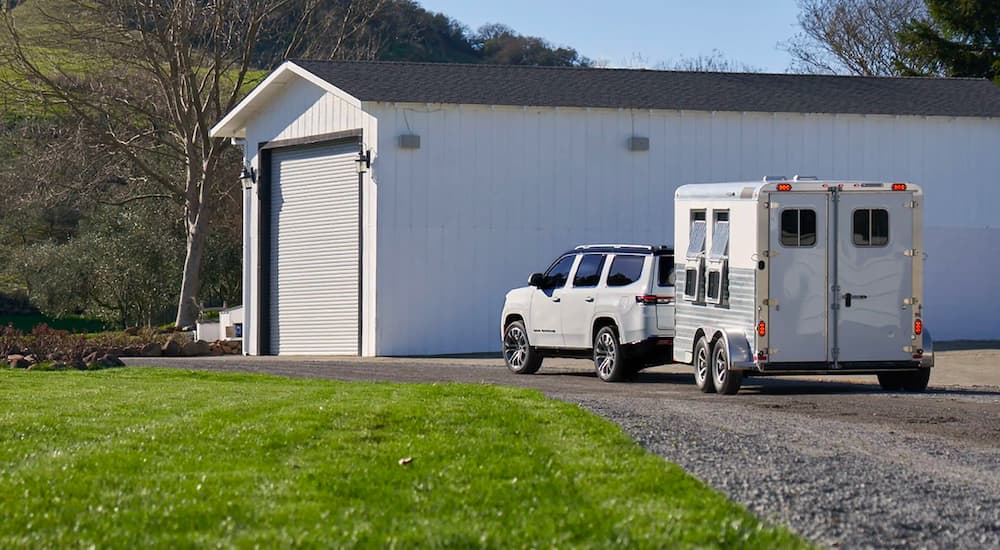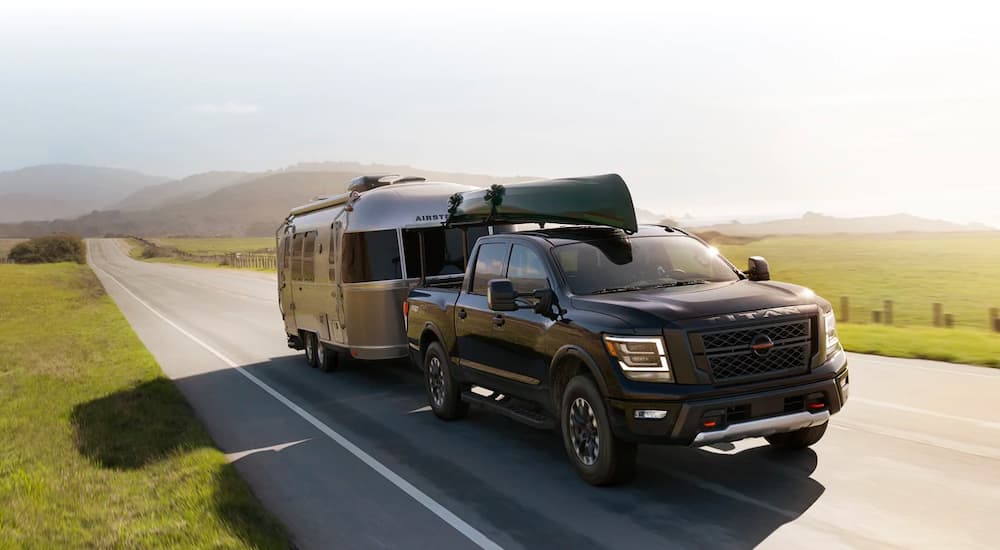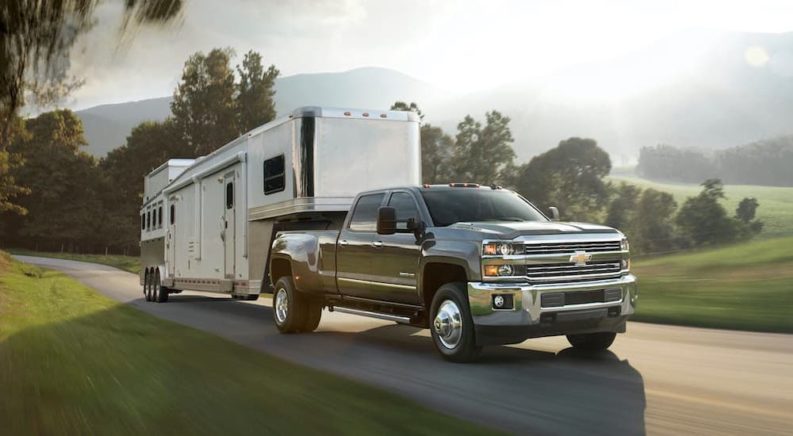If you’re eager to hit the open road and you’re looking to pull a trailer, then you’ll need the right tires. Rest assured that there are cheap tires that can meet your towing needs without breaking the bank and still provide a safe and comfortable ride. However, if you have some serious towing planned, you can’t just go out and through any tires on your truck.
The first thing to consider is what tires you have right now. If you have a tire with a P rating, you’ll need to upgrade. P stands for passenger, and it’s too light to tow much. That is the sort of tire best left to cars and crossovers. For towing, you’ll likely need a tire with an LT rating. LT means Light Truck, and these have the durability needed for heavier towing. You might also see ST tires, which stands for Special Trailer and are even more rigid than LT tires. However, ST tires are only intended for trailers and should not be put on trucks.
Don’t worry, though. Let’s ease into this. We’ll start with some basics you should understand when buying tires for towing and trailering. Then we’ll dive into the more technical components you might find useful if you’re going solo in your quest for cheap tires to tow and trailer.
Generalities of a Towing Tire
First, you’ll want to think about the weather. All-season tires are the more basic tires that typically work well on surfaced roads and perform well in wet and dry conditions. But if you know that your towing trips will take you off the main road, you’ll want to consider an all-terrain tire. These tires have tread patterns that work better in extreme wet, mud, and snow conditions.
Next, if your current tires are seven years or older, you should replace them now. No matter how few miles you’ve traveled, the rubber will deteriorate over time. There are cheap tires in the market that you can buy on a budget, so don’t sacrifice safety over money and just get a new set of tires.
When you get new tires, consider several factors. One is sidewalls. Softer sidewalls tend to improve ride comfort and stability. Increased steel belts also increase stability, especially when towing a trailer. If you tend to have a lead foot, you’ll want a tire with higher heat resistance as your tires will heat up more at higher speeds. Yet if your trailer has ST tires, you should always keep it under 65 MPH to mitigate risk.
Next, really pay attention to tire pressure. Follow the maximum PSI rating found on your tire, so they don’t overheat and are pressurized for the proper towing capacity. For towing a trailer, you’ll need tires that have between 35 PSI and 80 PSI, depending on trailer weight and weather. Incorrect tire pressure will lead to uneven wear, and underinflated tires will cause tires to overheat quicker.
A huge buying factor with tires meant to tow is weight. Ensure you equip your truck with tires that fit the vehicle’s maximum towing capacity. In general, towing about 10% under the maximum is a conservative pro-tip to ensure the tires stay safe as terrain and weather can become a factor as well.
A final general consideration with trailing tires would be an inspection. Visually inspect your tires and check tire pressure before a trip for uneven wear, sidewall cracking, low pressure, debris in the tread, and holes or gashes. If you’re unsure what to look for, take it to a reputable local service center or tire shop. They’ll know what to look for in their safety check, and they can recommend budget-friendly yet high-quality replacement tires that you might be better off using should your existing tires need to be replaced.

Technicalities of a Towing Tire
If you intend to DIY your tire selection, you should really familiarize yourself with the technicalities behind towing and trailing tires.
First, there is the load index. This two or three-digit number describes how much weight the tire can handle. Higher numbers are better, but you will have to refer to a chart to know the exact weight the tire can handle. For instance, a 120 load index tire can support up to 3307 pounds. Put four of those on your truck, and the tires can handle a total of 13,228 pounds of vehicle and payload. If your truck was designed for comfort or off-roading, then it might not have tires that can safely support the full weight of your trailer.
To calculate what you need, you will want to look at the Gross Axle Weighing Rating (GAWR) and Gross Combined Weight Rating (GCWR) info for your truck when you buy tires for towing. The GAWR is located on the door jamb label of your truck and represents the maximum weight the vehicle axle supports. The GCWR is the maximum weight of the truck, its payload, the trailer, and its cargo. It is critical that you keep track of just how much weight you are towing. It is very easy to accidentally put yourself in a dangerous situation by overestimating what your truck and tires are capable of handling. If possible, try to get your truck and trailer combination weighed so you know exactly what your GCWR is.
Trusting Tires to the Dealer
Unless you are a true tire expert, consult your truck dealer. You should have a good working relationship with the dealer who sold you your truck and who you likely visit to keep it properly serviced. If they know your vehicle history and your needs, they’ll work with you and find you the right tires.
Here is a short punch list of criteria to consult with your dealer about in towing and trailering tires:
- Strong performance in all temperatures (think extreme heat and cold).
- Excellent handling in all weather conditions (think rain, snow, mud).
- Great grip to really grab the road on turns, braking, and in off-road elements.
- Durable so they have a long useful tread life and can go for thousands of miles.
- Contribute to a smooth, quiet, and comfortable ride.
You’ll find good tires from brands from Michelin (Defender), Cooper (Discoverer), General Tire (Grabber), Bridgestone (Dueler), Firestone (Transforce), Falken (Wildpeak), and Toyo (Open Country). While each brand and product has advantages and disadvantages, you’ll want to determine what matters most to you, given what you will trailer and tow.

Closing Out
You’ll want to consider factors like the tire type (P, LT, or ST) and probably go with an LT at minimum. You’ll also want to get a set of tires that has the right load index for your needs. Finally, you need to make sure that you have the right type of tire for the road conditions you plan to be towing on.
If you are buying tires yourself, then you’ll need to do some math to calculate the appropriate load-carrying capacity, GAWR, and GCWR for your truck and trailer combination. However, if you visit a reputable dealer or tire shop, they can handle the calculations for you. Finally, don’t worry about overspending. You can find plenty of safe yet cheap tires that balance budget with reliability.

